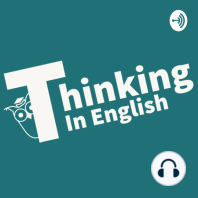1 min listen

73. The Weird Language of English Newspapers! (English Vocabulary Lesson)
73. The Weird Language of English Newspapers! (English Vocabulary Lesson)
ratings:
Length:
21 minutes
Released:
May 3, 2021
Format:
Podcast episode
Description
In this episode of Thinking in English, I want to introduce you all to the weird language of English newspapers. Newspapers are full of words, vocabulary, grammar, and types of sentences that we normally don’t use in everyday life. And for this reason, it can be difficult for English learners to understand journalism. Hopefully, by the end of this episode, you will have a clearer understanding of Journalese!!
TRANSCRIPT - https://thinkinginenglish.blog/2021/05/03/73-journalese-the-weird-language-of-english-newspapers-english-vocabulary-list/
Similar Episodes!!
47. How to Improve Your Written English (According to the Great Writer George Orwell!)
59. 5 Books Recommendations to Improve Your English!
35. How to improve your writing skills!
CONTACT US!!
INSTAGRAM - thinkinginenglishpodcast (https://www.instagram.com/thinkinginenglishpodcast/)
Twitter - @thinkenglishpod
Blog - thinkinginenglish.blog
Gmail - thinkinginenglishpod@gmail.com
Vocabulary List
Tabloid (n) - a type of popular newspaper with small pages that has many pictures and short, simple reports
In the UK, the Sun is the most popular tabloid
Confrontation (n) - a fight or argument
There were violent confrontations between police and demonstrators
intransitive verb (n) - a verb which does not have or need an object
In the sentence “I tried to persuade him, but he wouldn’t come”, “come” is an intransitive verb
Intentionally (adv) - with a plan or purpose
The company was accused of intentionally dumping garbage into the river
Ambiguous (adj) - having or expressing more than one possible meaning, sometimes, intentionally
His reply to my question was somewhat ambiguous
To convince (v) - to persuade someone or make someone certain
I hope this will convince you to change your mind
Abbreviate (v) - to shorten a word or words, or to make something shorter
We had to abbreviate the names of the states
Subtle (adj) - not loud, bright, noticeable, or obvious in any way
The room was painted a subtle shade of pink
---
Send in a voice message: https://anchor.fm/thinking-english/message
TRANSCRIPT - https://thinkinginenglish.blog/2021/05/03/73-journalese-the-weird-language-of-english-newspapers-english-vocabulary-list/
Similar Episodes!!
47. How to Improve Your Written English (According to the Great Writer George Orwell!)
59. 5 Books Recommendations to Improve Your English!
35. How to improve your writing skills!
CONTACT US!!
INSTAGRAM - thinkinginenglishpodcast (https://www.instagram.com/thinkinginenglishpodcast/)
Twitter - @thinkenglishpod
Blog - thinkinginenglish.blog
Gmail - thinkinginenglishpod@gmail.com
Vocabulary List
Tabloid (n) - a type of popular newspaper with small pages that has many pictures and short, simple reports
In the UK, the Sun is the most popular tabloid
Confrontation (n) - a fight or argument
There were violent confrontations between police and demonstrators
intransitive verb (n) - a verb which does not have or need an object
In the sentence “I tried to persuade him, but he wouldn’t come”, “come” is an intransitive verb
Intentionally (adv) - with a plan or purpose
The company was accused of intentionally dumping garbage into the river
Ambiguous (adj) - having or expressing more than one possible meaning, sometimes, intentionally
His reply to my question was somewhat ambiguous
To convince (v) - to persuade someone or make someone certain
I hope this will convince you to change your mind
Abbreviate (v) - to shorten a word or words, or to make something shorter
We had to abbreviate the names of the states
Subtle (adj) - not loud, bright, noticeable, or obvious in any way
The room was painted a subtle shade of pink
---
Send in a voice message: https://anchor.fm/thinking-english/message
Released:
May 3, 2021
Format:
Podcast episode
Titles in the series (100)
Thinking in English: Show Trailer by Thinking in English